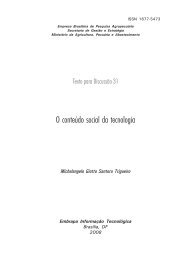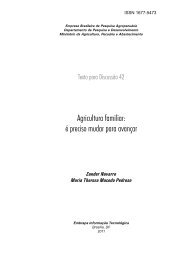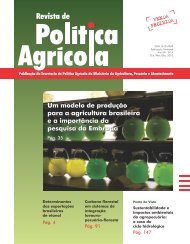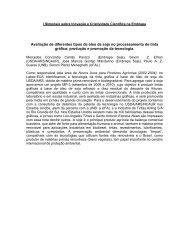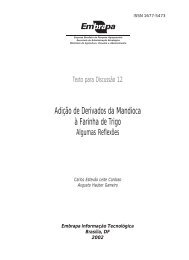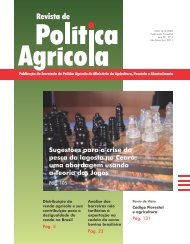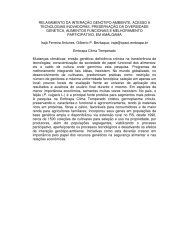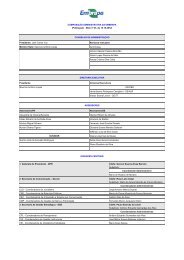Ministry of Agriculture, Livestock and Food Supply - Embrapa
Ministry of Agriculture, Livestock and Food Supply - Embrapa
Ministry of Agriculture, Livestock and Food Supply - Embrapa
You also want an ePaper? Increase the reach of your titles
YUMPU automatically turns print PDFs into web optimized ePapers that Google loves.
solar radiation <strong>and</strong> plentiful manpower are available. These projects would<br />
provide advantages for both labor <strong>and</strong> capital <strong>and</strong> from the private <strong>and</strong> social<br />
st<strong>and</strong>points when compared with even the most pr<strong>of</strong>itable crops.<br />
Leadership in the international bi<strong>of</strong>uel market. Brazil's comparative<br />
advantages enable the country to seek a leading role in the international bi<strong>of</strong>uel<br />
market <strong>and</strong> promote energy products derived from agroenergy. An expansion<br />
<strong>of</strong> exports would bring in hard currency, consolidate the agroenergy sector<br />
<strong>and</strong> provide an added thrust to the development <strong>of</strong> the country.<br />
Compliance with environmental policy. Agroenergy programs should<br />
comply rigorously with the Brazilian environmental policy <strong>and</strong> the provisions<br />
<strong>of</strong> the Clean Development Mechanism <strong>of</strong> the Kyoto Protocol, increasing the<br />
use <strong>of</strong> renewable sources <strong>of</strong> energy with diminished greenhouse gas<br />
emissions.<br />
The position <strong>of</strong> the federal government as regards the future supply <strong>of</strong><br />
energy from renewable sources has gone beyond a merely public<br />
administration issue <strong>and</strong> has become a State matter because <strong>of</strong> its<br />
comprehensiveness <strong>and</strong> consequences for the development <strong>of</strong> the country.<br />
The supply <strong>of</strong> energy at high prices compromises economic development,<br />
job <strong>and</strong> income generation <strong>and</strong> the welfare <strong>of</strong> the Brazilian people.<br />
<strong>Agriculture</strong> is a viable alternative for the generation <strong>of</strong> renewable energy<br />
from the economic, social <strong>and</strong> environmental points <strong>of</strong> view. Alcohol production<br />
from sugarcane is a successful example worldwide, because it has enabled<br />
the replacement <strong>of</strong> a substantial part <strong>of</strong> the gasoline used in transportation<br />
with alcohol. It is possible to repeat the process with other types <strong>of</strong> biomass.<br />
There are various challenges to be met, including the development <strong>of</strong><br />
agronomic technologies, which involves the selection <strong>of</strong> the best plants species<br />
<strong>and</strong> the most efficient production systems for this purpose, as well as the<br />
regions with the highest production potential. It is also necessary to develop<br />
new industrial technologies to transform the agricultural products into<br />
bioenergy.<br />
The large-scale production <strong>of</strong> agroenergy not only would diminish energy<br />
costs when compared with petroleum, but also has environmental advantages,<br />
in addition to creating income <strong>and</strong> jobs in the rural sector. In other words, it<br />
would promote the sustainable development <strong>of</strong> the Brazilian hinterl<strong>and</strong>s,<br />
particularly <strong>of</strong> the remote regions.<br />
Since agriculture has been established as a viable alternative to face<br />
the challenges involved in producing agroenergy, the <strong>Ministry</strong> <strong>of</strong> <strong>Agriculture</strong>,<br />
12



